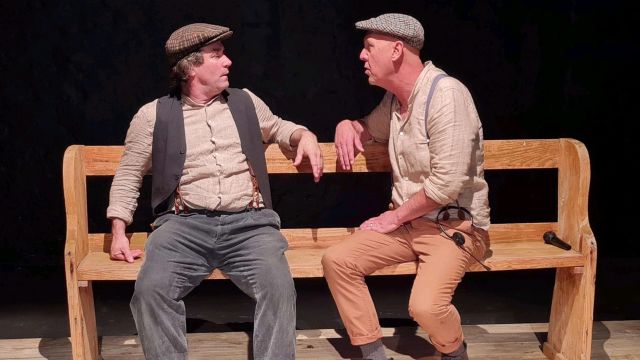Stones in His Pockets
Charlie Conlon is trying to persuade the food van to give him a second pudding when he first meets Jake Quinn. They are both extras on a Hollywood movie set in the lush green south-west of Ireland, along with what seems like half the town, most of which are related to Jake in some way. With a film crew being the buffer between the US leads and the local extras keen to earn their ‘forty quid’ whether or not the sun shines, there are some fifteen characters here. Each giving us an insight into how reality is transformed beyond recognition into a movie; and all fifteen played by just two actors fighting to be heard above the outside storm battering the Bakehouse Theatre roof.
Brendan Cooney takes on Charlie, with Scott Nell being Jake, and between them they give us plenty of reasons to chuckle through the verbal and physical comedy, to feel sad and angry, then to laugh out loud again. Their alternate characters are drawn through voice, physicality, and subtle costume changes (a scarf, a headset, a cap’s peak turned) and each one is delineated from the next. The changes are often fast, but the way that Cooney and Nell transform between them is magnificent: you can almost see two of them when Nell’s old man Mickey staggers off stage, leaving behind Nell’s Jake talking to him.

Cooney is at his best when he’s Carolina Giovanni, trying to seduce Jake with smouldering eyes and pouting lips, but mostly, he’s Charlie (though his accent is more Derry than Kerry). Nell is an excellent Aisling, directing the crowd through each take with an authoritative ‘Settle!’, but has so much to show us just with Jake. He’s a laidback local, a homesick traveller, an angry relation, and it’s his emotional range that expands ours. The audience’s laughter gets so much that it’s infectious to the pair on stage, but they work through it professionally – even when one of them forgets which scene he’s in, he uses the play’s movie setting to prompt his memory – and our awareness of this doubles our laughter.
Originally written for a Belfast festival in the late 1990s, it’s been staged north and south of that island, across the Irish Sea and the Atlantic to great critical acclaim, and winning many awards, including two Oliviers. While distinctly Irish in tone, it has a broader narrative: of movies warping reality to give the audience what (the producers think) they want; and of leaving behind starry-eyed wannabes oblivious of the reality of success: when Jake asks Carolina how she made it big, she only tells him ‘You don’t want to know about that.’

The tragedy amongst the comedy is desperately sad, and it’s handled sensitively by the Irish writer Marie Jones and local director Joh Hartog. The pause in laughs is temporary; Celtic black humour lifting the tone – but never eliminating it. That sharp, dark edge remains to the end, regularly cutting Jake or Charlie. Yet the play balances the light and dark with hope – and under Hartog’s direction, both Cooney and Nell walk that tightrope without many wobbles.
There is the usual decent lighting and sound design from Stephen Dean, and Tammy Boden’s simple earthy set and costume design leaves the bold colour to the performances of Nell and Cooney.

‘You don’t go to the movies to be depressed; that is what you go to the theatre for’ suggests Jake, but here you’ll be lifted above the tragedy, and you’ll leave with no stones in your pockets.
Mark Wickett
Subscribe to our E-Newsletter, buy our latest print edition or find a Performing Arts book at Book Nook.

